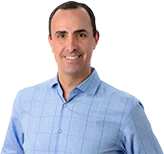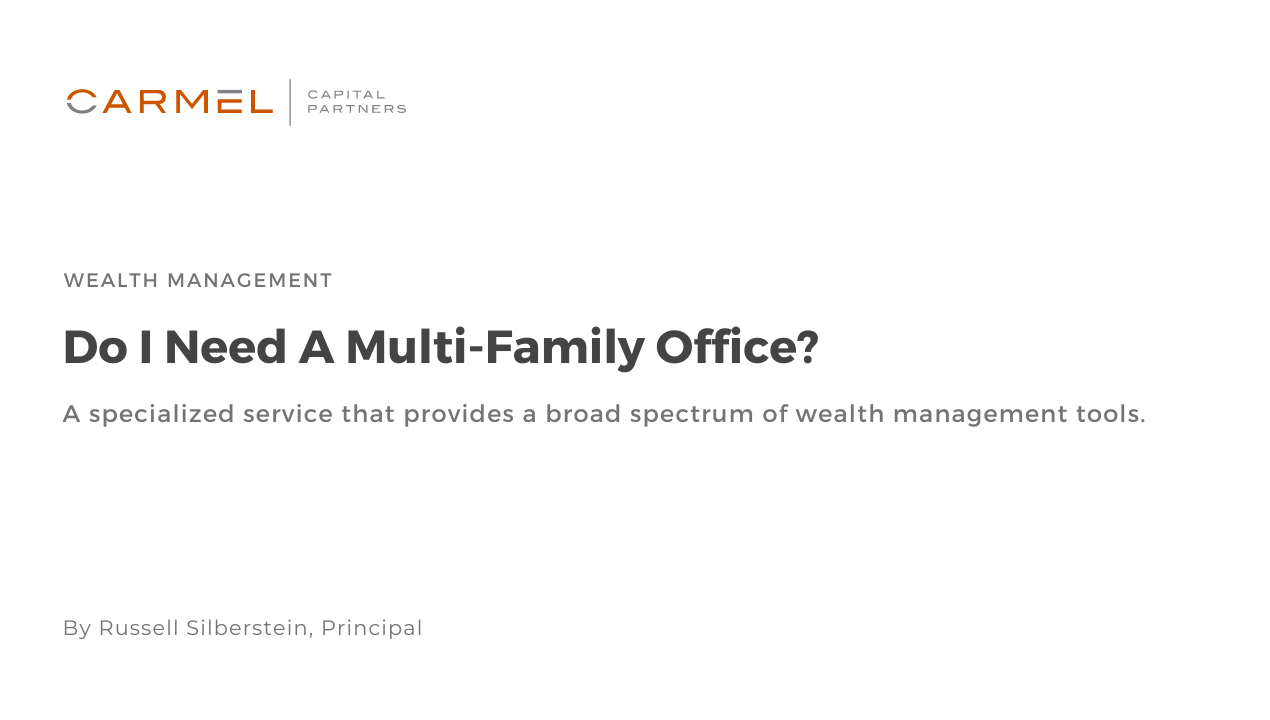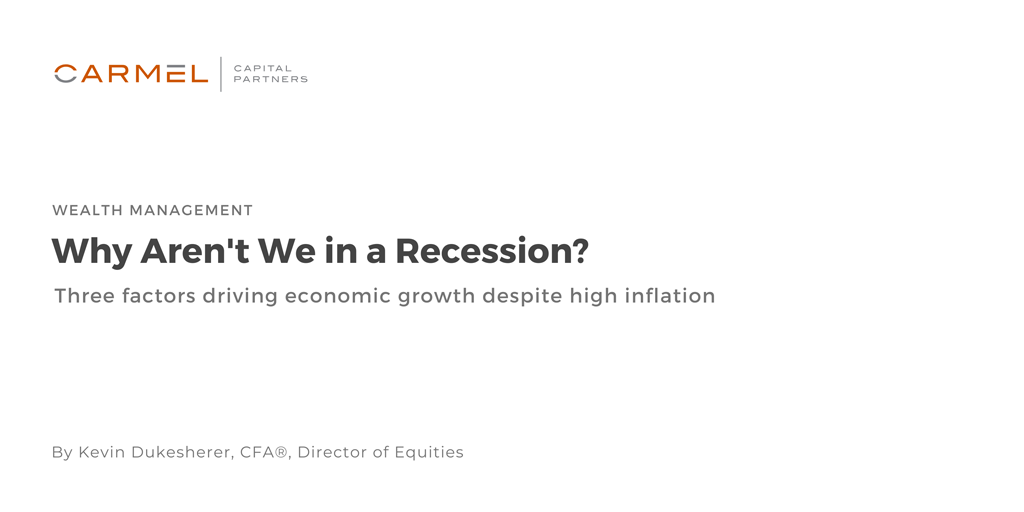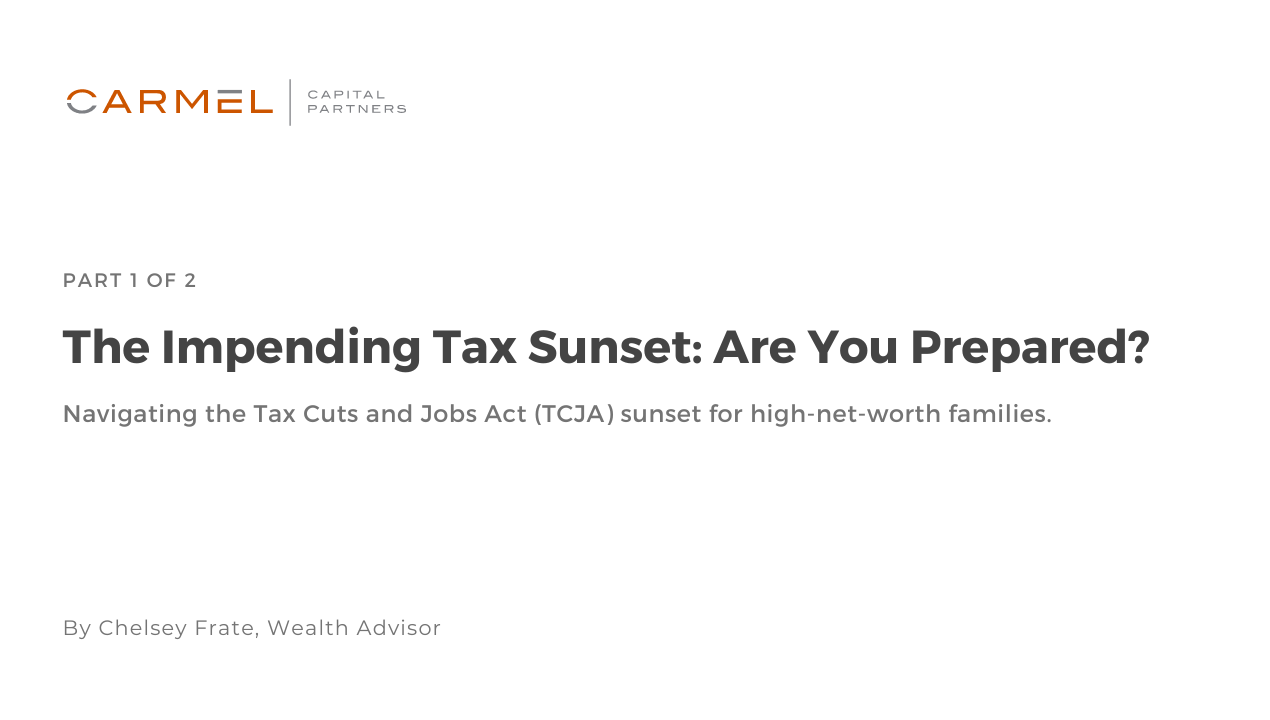Do I Need A Multi-Family Office?
As individuals, families, and businesses accumulate wealth, their financial lives inevitably become more complex. With this complexity, a...
5 min read
 Russell Silberstein
:
September 18, 2023 5:00 PM
Russell Silberstein
:
September 18, 2023 5:00 PM
Over the course of my twenty-plus years as a professional investor, I have given a great deal of thought to the idea of accountability. The challenges and successes of wealthy families are often measured in decades, even generations, and sophisticated investors are accountable in their own lives for a complex interconnected set of responsibilities: the family’s financial security and legacy, as well as taxes, insurance, estate planning, non-profit causes, and often managing their own businesses.
But who is accountable to them? What these investors need, and often do not have, is someone who is willing to be accountable in an all-encompassing way, over the long term. Someone who is committed to making sure all the pieces of the plan are working together, to achieve each family’s unique financial and investment objectives, even as their wealth may pass from one generation to the next.
That’s a very different kind of accountability and commitment than just putting together a portfolio of funds, or entering numbers and data into software, and calling it a day. Each family is a living and breathing entity, with ever-changing and evolving goals and needs. Even the most well thought out asset allocation strategy cannot account for all the varied roles that an investor’s assets are supposed to play in a financial life that complex.
So, what does true accountability mean to us, as advisors? It demands a very different kind of approach to how one helps families build and manage wealth. It requires a very different kind of wealth management firm – one with sufficiently robust investment expertise and execution to meet the complex needs of the families we serve. Finally, it demands a specialized capability in managing a large network of other professionals, each of whom owns a small piece of the financial puzzle without any accountability for how the whole plan comes together.
For the wealthy families we work with, each piece of their financial plan affects every other piece. Every outside professional must be accountable to every other. And what these investors really need is one resource to be accountable for it all – someone willing to assume responsibility for keeping the entire strategy on track over the short, medium, and long term, even in the face of volatility and change.
That is the value Carmel strives to deliver: a steady hand, guiding all the many players on the team, whether those are estate attorneys, accountants, insurance brokers, or others. Very few professionals in an investor’s life can deliver, or even offer, to fill that role. Carmel, on the other hand, thrives in relationships where we assume full accountability for execution of all the many aspects of the plan through market cycles, and the many phases and challenges of an investor’s life.
That kind of accountability cannot be executed without comprehensive data gathering: a meticulous, rigorous process for understanding all the moving parts of your financial, family, and business life. Only with that level of understanding we can create a bespoke financial and investment management plan that’s customized to the unique needs of each family.
This process also has a secondary benefit: it creates a central hub for information, provided by bankers, lawyers, insurance brokers, and other professionals. It ensures a holistic view of the work of all those professionals, i.e., how all their work fits together within a single, unified financial plan. It also enables comprehensive reporting, so that you can see, at any given moment, not just investment results, but also how the investing strategy dovetails with the plan’s other moving parts.
As a sophisticated investor, you hire an investment advisory firm primarily to manage money, but those invested assets play multiple roles in your broader, and often complex, financial life. You may have many goals over many time horizons: liquidity, cashflow, tax efficiency, long-term capital growth, business planning, estate and gift planning, charitable giving, etc. Meeting those goals requires capabilities well beyond even a moderately complex investment tool kit.
So, what should you expect from a wealth management firm? What’s truly required to deliver the kind of broad accountability that will help you achieve your wide-ranging objectives?
First, we believe that the best performance measure for an investment portfolio is after-tax return. It does wealthy investors no good for an investment to deliver exceptional returns on a pre-tax basis, only for those returns to create a liability in their portfolio, or in some other area of their financial life. That can happen very easily in a high-tax state like California. It’s why we believe tax-awareness is one of the bedrock principles that should guide the investment strategy of every wealthy family.
To achieve high levels of tax-efficiency, you will need a concrete strategy for gaining maximum control over the tax impacts of your investments. That is, no one can control raw return, or market volatility, or interest rates, or other macro issues. But with the right planning, investors can take proactive steps to defer or offset capital gains and other taxes using sophisticated strategies and vehicles. Carmel can help identify all the ways you can maximize your assets’ after-tax performance, while also potentially meeting a wide range of other planning needs.
Second, in tax-aware investing, we believe there is no substitute for a sophisticated direct-investing capability. Investing directly in stocks and bonds, rather than mutual funds or ETFs, enables you to utilize strategies like tax-loss harvesting, where investment losses can be used to offset capital gains in other areas of the financial or business portfolio. With mutual funds and ETFs, there is no opportunity to harvest losses strategically, which can inhibit an advisor’s
accountability for delivering on strategic goals like tax efficiency, cashflow, and capital protection.
For these same reasons, Carmel expanded its opportunistic investing approach to private equity and direct real estate back in 2017. Though at times these strategies can impact portfolio liquidity, they can also potentially enhance investment performance by delivering downside protection, volatility management, cashflow, and capital preservation. Accountability, I believe, also has to impact how advisors measure the performance of your investment portfolio. For wealthy families, investing is a lifetime challenge (a marathon not a sprint), and success is seldom measured in a single month or quarter, or even a single year. Therefore, it makes sense to measure investment performance over a rolling five-year basis, and to allocate assets with a similar view.
For example, at Carmel, we have held a lot of cash and very little fixed income for several years, even before the pandemic. Because we believed interest rates were too low, and did not want to expose our clients to the risks of rising rates – which hit many portfolios hard in 2022 and 2023. It was not a difficult decision to make. In the context of rolling five-year returns, it is easier to see the value to client portfolios. By contrast, advisors who are pressured to make benchmark allocations and meet quarterly targets can rarely make those kinds of medium-term strategic calls, perhaps to the detriment of their clients.
For wealthy families, investing has many purposes. Being accountable to you across all your many objectives means thinking more deeply about your family’s life challenges and building a firm with a comprehensive investment perspective, as well as the capabilities to deliver on each piece of the accountability puzzle.
This kind of engagement, I believe, delivers deeper thinking, better planning, and management, high-quality and timely decision-making, and may deliver better outcomes – while also relieving clients of a great deal of worry and work. It's a level of accountability I am deeply committed to. I have built my career on it, and I have spent decades building Carmel to deliver on that ideal.
The content is developed from sources believed to be providing accurate information. The information in this material is not intended as tax or legal advice. Please consult legal or tax professionals for specific information regarding your individual situation. The opinions expressed and material provided are for general information and should not be considered a solicitation for the purchase or sale of any security. Investment advisory services are offered through Carmel Capital Partners, an SEC Registered Investment Advisor.

As individuals, families, and businesses accumulate wealth, their financial lives inevitably become more complex. With this complexity, a...

The economy, in many aspects, resembles a living entity much like ourselves. It is capable of making decisions, yet its behavior is not entirely...

The Tax Cuts and Jobs Act (TCJA) of 2017 introduced numerous benefits to U.S. tax law but are set to expire at the end of 2025. Families might be...